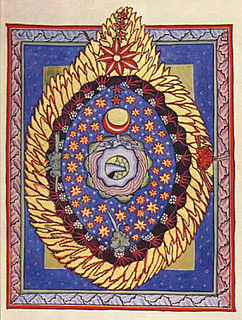
Hildegard of Bingen, also known as Saint Hildegard and the Sibyl of the Rhine, was a German Benedictine abbess and polymath active as a writer, composer, philosopher, mystic, visionary, and as a medical writer and practitioner during the High Middle Ages. She is one of the best-known composers of sacred monophony, as well as the most recorded in modern history. She has been considered by scholars to be the founder of scientific natural history in Germany.

Bochum, with a population of 364,920 (2016), is the sixth largest city of the most populous German federal state of North Rhine-Westphalia and the 16th largest city of Germany. On the Ruhr Heights (Ruhrhöhen) hill chain, between the rivers Ruhr to the south and Emscher to the north, it is the second largest city of Westphalia after Dortmund, and the fourth largest city of the Ruhr after Dortmund, Essen and Duisburg. It lies at the centre of the Ruhr, Germany's largest urban area, in the Rhine-Ruhr Metropolitan Region, and belongs to the region of Arnsberg. Bochum is the sixth largest and one of the southernmost cities in the Low German dialect area. There are nine institutions of higher education in the city, most notably the Ruhr University Bochum, one of the ten largest universities in Germany, and the Bochum University of Applied Sciences.

Bingen am Rhein is a town in the Mainz-Bingen district in Rhineland-Palatinate, Germany.

Hildegard, was a Frankish queen consort who was the second wife of Charlemagne and mother of Louis the Pious. Little is known about her life, because, like all women related to Charlemagne, she became notable only from a political background, recording her parentage, wedding, death, and her role as a mother.
Benjamin Bagby is an American singer, composer, harpist, and performer of medieval music.

Schule Schloss Salem is a boarding school with campuses in Salem and Überlingen in Baden-Württemberg, Southern Germany. It is considered one of the most elite schools in Europe.

Deutsche Schule Istanbul, with formal Turkish name Özel Alman Lisesi or İstanbul Alman Lisesi or simply Alman Lisesi is a private international high school in the Beyoğlu district of Istanbul, Turkey. It is responsible to both the Federal Ministry of Education and Research of Germany and the Ministry of National Education of Turkey.

Eibingen Abbey is a community of Benedictine nuns in Eibingen near Rüdesheim in Hesse, Germany. Founded by Hildegard of Bingen in 1165, it was dissolved in 1804, but restored, with new buildings, in 1904. The nuns produce wine and crafts. They sing regular services, which have been at times recorded. The church is also used as a concert venue. The abbey is a Rhine Gorge World Heritage Site.
Ordo Virtutum is an allegorical morality play, or sacred music drama, by Hildegard of Bingen, composed c. 1151, during the construction and relocation of her Abbey at Rupertsberg. It is the earliest morality play by more than a century, and the only medieval musical drama to survive with an attribution for both text and music.

Saint Bertha of Bingen was the mother of Rupert of Bingen. Her biography was written, and subsequently her cult popularized, by Hildegard of Bingen, who lived in the same region, about four hundred years later. Bertha and Rupert share a feast day on 15 May.

The Alexander von Humboldt German International School Montreal (AvH) is an international private co-educationnal multilingual school located in Baie-D'Urfé, Quebec, a West Island suburb of Montreal. It was founded in 1980 to educate the German community of Montreal.

Colegio Alemán Alexander von Humboldt, A. C. is a network of German-language primary and secondary schools based in Greater Mexico City.

Scivias is an illustrated work by Hildegard von Bingen, completed in 1151 or 1152, describing 26 religious visions she experienced. It is the first of three works that she wrote describing her visions, the others being Liber vitae meritorum and De operatione Dei. The title comes from the Latin phrase Sci vias Domini. The book is illustrated by 35 miniature illustrations, more than that are included in her two later books of visions.

The Gymnasium am Ostring was the oldest gymnasium in Bochum. It was founded in 1860 and closed after the 2009-2010 school year.

Albert-Einstein-Schule was a Gymnasium for boys and girls from grades 5–13 in Bochum, Germany. It had about 900 students. Just south of downtown Bochum, the school was in the Wiemelhausen section of town and shared a campus with the Hans Böckler Realschule. The school had an emphasis in natural science and English. It had a bilingual program, where some classes were taught in English, rather than German. In 2008, the school was certified as a "Europaschule" (de) by the Ministry of Schools of North Rhine-Westphalia. The school held its final day of classes on 14 July 2010.

Vision is a 2009 German film directed by Margarethe von Trotta.

Barbara Stühlmeyer OblOSB is a German theologian, musicologist, author, especially a Hildegard scholar and a science journalism.
Beverly Mayne Kienzle retired in 2015 as the John H. Morison Professor of the Practice in Latin and Romance Languages at the Harvard Divinity School, Harvard University. She is a specialist in Christian Latin, Latin paleography, and medieval Christianity. She has published over seventy articles and fifteen books, including five on Hildegard of Bingen. Her latest book is an authoritative biography of her grandmother, Virginia Cary Hudson, author of the best-selling O Ye Jigs and Juleps!.

Clementia Killewald OSB was a German Benedictine nun, at Eibingen Abbey: serving first as an organist, then by taking care of the elderly and sick, and finally from 2000 as the abbess. She introduced the life and work of Hildegard of Bingen, the convent's founder, during the 2012 ceremony when Pope Benedict XVI proclaimed Hildegard a Saint and a Doctor of the Church.
The Hildegard von Bingen Prize for Journalism is an annual journalism award. Since 1995, it is awarded by the Board of Trustees of the Hildegard von Bingen Prize. Former award winners are members of the Board of Trustees. The award was founded in 1995 by the biographer and journalist Helmut Ahrens. A publicist is honored "for an outstanding, professionally and culturally important journalistic individual achievement or a life's work." The prize money is €10,000. The award is named after the medieval abbess Hildegard von Bingen.


















